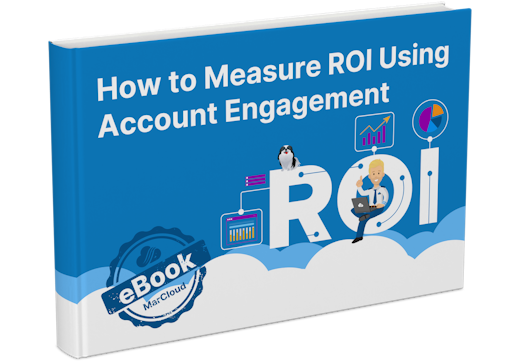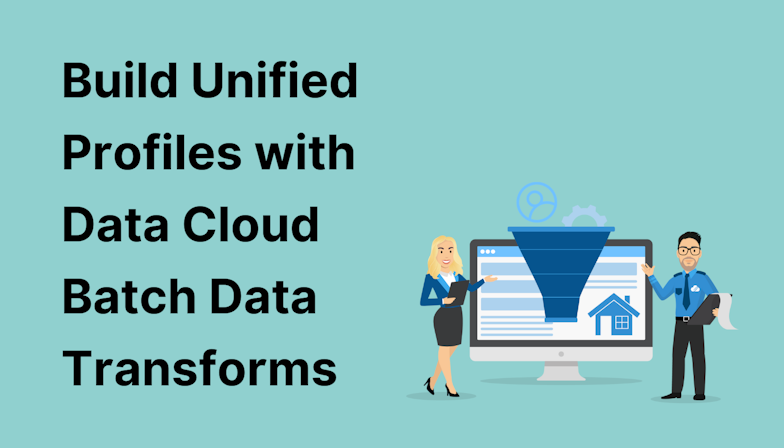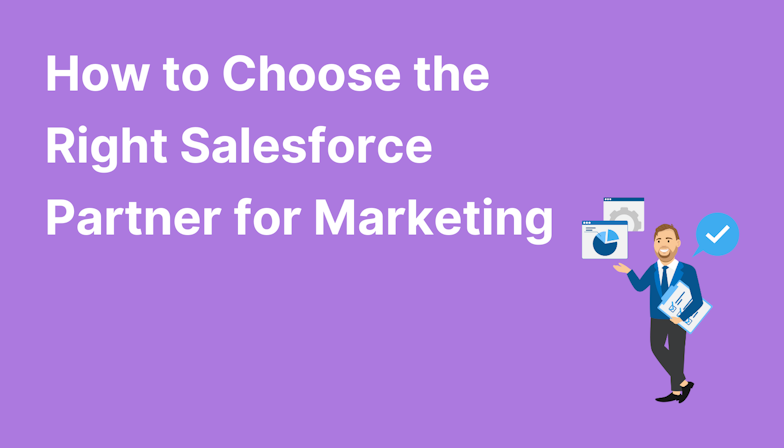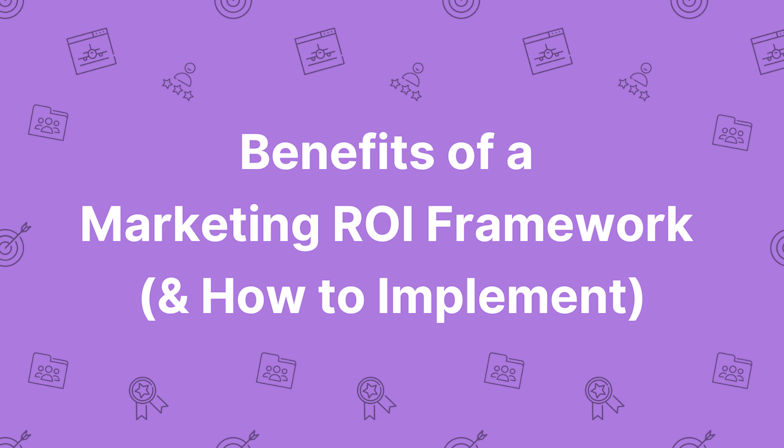Prefer to read? No problem. Find a summary transcript of our conversation below.
If you need support with integrating your Salesforce accounts or producing reliable, accurate reports that demonstrate the metrics you need, don’t hesitate to contact us.
Podcast transcript
0:36 MarCloud
Why don't you introduce yourself to everybody who's listening today?
0:47 Stephen
Over a decade ago, I got an internship for a marketing automation analyst position. My background was actually originally front-end development, kind of IT-focused. And then in my internship, my manager left the company. They're like, well, you're the next best person who knows this Pardot thing, this is yours. I kind of grumbled. Oh my gosh, I don't know anything about marketing automation. I didn't want anything to do with it. And then I just fell in love with it, and I've been in it ever since.
So I've got about a decade of experience with marketing automation, ranging from Pardot, Marketo, HubSpot, Marketing Cloud, Salesforce, and marketing automation migrations. I've done a little bit of everything; worked with nonprofits, multi-billion dollar companies, gone through a couple of acquisitions, and now I find myself as the VP of Digital Transformation and Innovation at SaasCent, which is a marketing ops agency. Wow, what a journey.
2:05 MarCloud
And how much of the original swag do you have before Pardot became Account Engagement?
Stephen
I have original Pardot t-shirts, like the one with the spiky, pointy Pardot logos. I almost wore it to Dreamforce this year, because there was a meetup and it was like the Pardashians!
2:55 MarCloud
You were speaking at Dreamforce, how was that?
Stephen
Yeah, it was a lot. There were a lot of people there, but it's so much fun. I talk to people all the time on LinkedIn and there's this amazing community, but you very rarely get to meet up in person and Dreamforce is that one time a year that I get to meet up and put faces to all the amazing conversations I'm having online.
3:36 MarCloud
One area you seem to be very active on LinkedIn and a guru of the topic is marketing operations, but what we're talking about specifically today is RevOps and in particular, how somebody can get such an operation off the ground; what to look for, pitfalls, things to consider. So for everybody else at home, can you just explain first and foremost what RevOps is and potentially what it isn't?
4:07 Stephen
So you have marketing operations, sales operations, and RevOps. If you think about marketing operations, you can think about all of the marketing initiatives and the efficiency behind those. So I'll just use a very simple example, something like demand generation with LinkedIn forms, or Facebook paid media, or maybe the website.
When we think about marketing operations, it's just the efficiencies behind all of those tactics and campaigns. For marketing - now I will say that everyone's responsible for revenue, but it's such a fluffy thing that I hear everyone talk about, but when everyone's responsible for it, no one's responsible for it. Marketing ops is pretty much up to the point where you qualify a lead and you pass it to sales. And then you've got sales ops, which is gonna pick it up from there.
With the sales team, you have all the go-to-market technology. They typically use CRMs, so they're responsible for the efficiencies behind the CRM side or more on the sales side. And you've got things like drift and outreach and intercom and all those tools that maybe sales uses on a day-to-day basis. So that would be kind of the sales ops piece.
And then on the rev ops side, it can be quote to cash. Once an opportunity is closed, the baton gets passed from sales operations to the rev operations side, where now rev ops is responsible for making sure the efficiencies of getting the money, getting the renewals, getting those expansions, and working with customer success to make sure that all of that is running smooth. Depending on how big your org is or depending on how it's structured, sales ops and marketing ops will roll into rev ops. And rev ops is kind of that larger umbrella that is trying to make everyone talk to each other and make sure that there are no hard lines in the sand, but everyone has a sense of responsibility kind of across the board.
6:20 MarCloud
My next question was going to be what the difference is between sales ops and marketing ops, but I think you kind of hit the nail on the head there. It's essentially, instead of having separate teams, rev ops is a way of bringing those teams together under one umbrella, so there are no siloed kind of walls between departments, right?
Stephen
Yeah. And it depends on the company too because I don't want anyone to hear what I'm saying and take it as kind of law. It's so different. For smaller companies, there's no luxury of departments, right? If you work at a startup or a medium-sized company, there is no rev ops, marketing ops, and sales ops. It's probably one or two people doing the job of everything. So it's a little bit of a maturity complex where once you grow in the company, you're gonna have so many tools that one person cannot just keep up. And then that person typically falls within those three buckets. Either they fall on the finance side where they might align a little bit more toward rev ops. Or they might fall on the sales side.
Maybe you have a BDR or an AE or a technical solutions engineer on the sales side who's really technical savvy. And maybe they want to take over the sales ops side. And then on the marketing side, it typically starts in the marketing side because the marketing automation tools are just so prevalent right now, like Pardot, HubSpot, and Marketo.
It's almost like operations is birthed from marketing and then kind of spawns across the board or the organisation. Or sometimes it comes from IT too.
8:17 MarCloud
What do you think the problem is that RevOps is trying to solve?
Stephen
The technical expertise that is needed now in marketing has never been so high. If you want to send an email, you could send just a text email, but if you want a HTML email and you want a landing page and you want some forms and you want to capture that data, it requires a fair amount of knowledge of structuring HTML and tables, versus something like front-end development where you might do things in devs. Then you have the data flow from system to system. And I think that marketers were kind of caught off guard where it's no longer making pretty things and just pushing out graphics.
It's now connecting systems to systems. And when you have to connect systems to systems, you need someone a little bit more technical. And oftentimes the design attribute of a person as far as a hard skill and then the technical side, they don't always go together. You can't find oftentimes one person who can do both. So then it opened up the door, I think to more of the technical side. And now you've got operation folks running teams.
9:25 MarCloud
What you're saying there reminds me of a comparison year on year from the early noughties right through to now of all the potential Martech systems that are out there. As you can imagine, 2023 is so small that you can't even see the logos of the companies anymore.
Stephen
I'm very curious to see how it looks in 2024 with all of the AI and GPTs that are being created. It's just gonna get smaller and smaller. Marketing's gonna become a smaller and smaller part of a much bigger tech ecosystem.
10:18 MarCloud
So I guess what you're saying there is that RevOps is a way of trying to marry that up and bring in that technical expertise into the marketing team as well. Where do you see the overlap between the teams? And do you think that's the reason that RevOps exists as well?
Stephen
I don't know if it's why RevOps exists, but it's definitely relevant to any organisation that has these departments or those who don't. But you've got data compliance, I think there's an overlap, right? GDPR comes to mind, everyone's responsible for GDPR. Someone comes in from a marketing email and they reply to that email and they say unsubscribe or they exercise their right to be forgotten. Marketing's responsibility is to make sure they handle that.
But when you have all these systems within the organisation from marketing all the way up to finance, finance also has to delete some information, sales has to delete some information for the CRM, right? So everyone is responsible for data compliance and they have to be talking to each other because if marketing gets the request, then they just delete them from their systems, but then finance and sales doesn't, you're no longer being compliant. I think compliance brings everyone to the table and forces a conversation around data quality and data hygiene, regularly cleaning up things and just doing what you should be. And then I would say, as far as the optimisation of those batons being passed from department to department, there have to be conversations.
Also, overall just strategy of what do we want the user experience to be? You can't be working in silos. Marketing can't be in one silo and then have sales in another silo and then finance in another silo. All the teams have to talk to each other and map out what that user experience is gonna be.
I think it's important that they draw lines in the sand and they say, you know what, marketing, you're responsible for this, we're responsible for this. Otherwise, you're gonna get people saying, oh, everyone's responsible for revenue.
MarCloud
And I think what people shouldn't lose sight of is that whole quote to cash cycle, cash isn't the closed won opportunity, but it's actually money booked, invoiced, booked, right? So we aren't just talking about marketing and sales here. You're talking about customer success, finance who invoice the customers, and get that booked in against their accounts. That's all part of the process as well, right?
13:30 Stephen
I mean, getting the money, setting up the recurring payments, making sure that that's a seamless process. When, you know, banks foreclose, having a system and an infrastructure in place to be able to pivot a little bit on that and just making it easy. You know, I can't tell you how many times I've wanted to purchase from a company and it was like jumping through hoops.
You had to send a fax, you had to do this, you had to do that. Adding all of that friction just makes customers, even if they are customers, to not wanna do business with you and do business with someone else, not because of your product and service and customer support or anything like that, but because it's just difficult to do business with you and payments. It's not flexible.
14:11 MarCloud
The RevOps side is super important because that's how customers become stickiest because they continue to have a great experience above and beyond just the marketing and working with sales. That's a really good point.
14:30 MarCloud
You've just come back from Dreamforce where it was no doubt, all AI, but the one product that Salesforce is uber pushing at the moment and seems to be the direction that they're taking is Data Cloud. With that in mind, where do you see a system like that coming into play where you're just talking about that customer experience.
Stephen
I put Data Cloud in the bucket of almost iPaaS solutions, right? Once you get to the size of Salesforce, it's easier to buy companies than it is to create products and services. And they bought some really good companies. And I think it plugs lots of little niches. Tableau comes to mind, Slack comes to mind, right? You can see the problems that they're solving.
But when you buy all these companies, you have to unify the data to integrate it into your core platform. Salesforce is the core platform. Data Cloud, I think, is their solution to that. So they can pick up these companies, they can move quickly, they can innovate. They're probably gonna acquire some sort of GPT or some sort of AI tool.
But when they do that, they need to put it into some sort of central repository where they can augment and change the structure of the data to fit it into what can be injected into Salesforce.
So when I hear Data Cloud, I hear integrations, I hear flexibility, I hear, you know, ERPs. You get things like NetSuite and you wanna plug something as complicated as NetSuite into Salesforce, well, good luck. Data Cloud, I feel like can help solve that.
You can pull data from NetSuite into Data Cloud and then you can augment it, you can change it, you can create those data layers, data structures, and then funnel that into Salesforce. And then you can start to get the reporting and whatnot, you know, into Tableau. So it's kind of like, if you think of hub and spoke model, I think Data Cloud's becoming the hub, and then all of the spokes are gonna be the integrations and Salesforce being probably the biggest one.
17:32 MarCloud
That's a really good summary. And just to caveat, don't base your investment decisions in Salesforce on what me and Stephen have talked about there. We have no insider information whatsoever.
Stephen
No, no, no, I have no insider information. It's inevitable that all of these companies like HubSpot, Salesforce, Marketo, which is Adobe now, they're gonna be putting time and money behind AI. Either they're gonna create it in-house and do it themselves, which it seems like that's what Salesforce is doing right now, or they're gonna buy a company like OpenAI or, you know, I know Google's creating their own.
Licensing too, I think it wouldn't be completely unheard of if OpenAI were to just license out their tool and then like give it to Salesforce and give it to HubSpot for them to do a white label solution and have it integrated that way.
18:47 MarCloud
If we've got an organization that wants to bring the teams together, essentially create a RevOps umbrella, what advice you would give in terms of how to start that process and even some of the pitfalls to avoid?
Stephen
As far as starting the process, I think it involves a conversation. I think that teams need to talk to each other. They need to have a seat at the table and they need to understand each other's processes because I can't tell you how many times I've stepped into an organisation where someone's just said, you know what, nothing works. The last person who set this up didn't know what they were doing.
But then you look at like this last person was there for like 10 years. Maybe they did know what they were doing and there was a reason why they didn't do it, right? Or didn't do it a certain way. I think everyone needs to approach conversations from a point of good intent, just assume good intent from each team.
Assume that they're wanting to do best for the organisation and understand the problems that they're trying to solve. If you're in marketing ops, maybe sit on some sales calls, maybe sit on some internal meetings on the sales ops side of the house to understand how the CRM runs. And then if you're in marketing ops or sales ops, if you're working in partnering with finance, understand their pain points, understand what they're trying to solve or the biggest issues that they run into on the customer side, or getting money. Just talk to each other. It seems like such a basic thing.
And then my other thing would be have a central repository for documentation. My team uses Miro. It's an amazing tool. You can map out all of your data processes, the customer journey, all of it.
I would encourage each team to map out their process yearly, and maybe the things that have changed from marketing, sales, finance. Have those individuals and then have one master record. This is how they fit together. This is where they overlap. This is the do's and don'ts. Having that document is invaluable, especially when you hire new people and try to scale the business.
21:27 MarCloud
I think it begs the question that who would own that documentation? Because essentially if you've got marketing, sales, customer success, finance, there's four teams there at the table, right? So who owns that process in terms of keeping that documentation? Who owns the documentation?
Stephen
Yeah, that's probably a little tough to answer. Every business is a bit different, but I'm gonna go ahead and point the finger, RevOps. If there's a RevOps leader, it's their responsibility to make sure that sales and marketing are aligned and they're aligned with the RevOps departments.
Otherwise, I would say whoever has the biggest budget. If you've got a big sales ops team and a small marketing ops team, I think it's up to the sales ops department to make sure that they're aligned.
Or if the budget's on the marketing side, maybe it's up to them.
22:31 MarCloud
I think you make a good point. Not everybody thinks of trying to do something now for new starters. As you grow, you have new people joining the team. They obviously need to get up to speed of how you do things as well. So even from that standpoint, it's not just a way of everybody who's at the table now essentially saying this is what we've discussed right now. This is a way of kind of safeguarding the future of, you know, people joining the team, getting them up to speed, making sure that new hires are essentially doing things the customer way or the client way, whoever the client may be.
23:06 MarCloud
One of the things I was gonna ask you about actually, that seems to be in every single org that I speak with, there just seems to be a natural divide, particularly between marketing and sales. It just seems to be this unwritten law that there seems to be this divide. Do you see this as a way of bringing those two together and why do you think that would solve that divide?
Stephen
I think there's gonna always be a natural, I don't know, competitiveness between sales and marketing. Marketing is gonna think that they're sending the best leads over to sales and sales is gonna, you know, always think that maybe they're not as good as they should be. But I think that if you hire the right people and you have the right culture and leadership is demonstrating what they want the company to be, there's always room for healthy rivalry, but there isn't room for big egos in the room. So I think RevOps can help smooth things over between marketing and sales and make sure that people are communicating and aligned. But I'm all for a little rivalry so long as it doesn't become toxic or too much.
And I'm gonna say it again, when someone says everyone's responsible for revenue, no one is responsible for revenue. And I think that ambiguity across the organisation can cause conflict and frustration. So that's where I think define roles and responsibilities, as much as you can, then put responsibility on marketing. So marketing knows exactly what they're responsible for and they can be held accountable. And when people don't get held accountable, departments see that and get frustrated.
If there are big conflicts between teams, it's probably because they don't know what they're accountable for. They're not being held accountable for it. And there are no metrics or KPIs up against those people.
Ambiguity breeds discourse.
25:09 MarCloud
We talked when we were setting up this episode about technical debt and things like that. Could you just touch on that and what that means in the context of RevOps?
Stephen
Yeah, I mean, you brought up Data Cloud, so let's talk about technical debt. ChatGPT, Salesforce ecosystems, HubSpot ecosystems, I think as we get new technology, more and more and more, the operations teams are gonna grow. We have to find a way to ease the tech burden on the ops teams. I go back to like 2000, oh gosh, let's say 2005.
I feel like everyone was in a buying frenzy, right? Everyone was like, oh, you need new technology. Drift just came out, there are chatbots. Chatbots are gonna be the new thing.
Forms are gonna go away. Everything's gonna be ungated. Email is dead, right? So people were just buying new technology.
And I feel like that's starting to settle down a little bit now that technology has been bought. Data is no longer something that people are trying to get. And we're looking at our ecosystem of technology and we're like, oh my goodness, we've bought so much tech. We can't even keep up with it. So tech consolidation is inevitable. People are gonna try to make the most of what they have, especially right now where the tech economy seems like it's not exactly flourishing.
You kind of have to do an in-house audit. Having the documentation I think is key. Understanding all the systems that you have access to and licenses for, how they're connected to each other.
Audit it on a quarterly basis and figure out what's needed, what's not needed. Because as fast as tech moves, you should also be looking at your contracts that you have and making sure that you are staying, and aligned with the vision of the company. So if you have an ERP and you're trying to integrate into Salesforce and Salesforce comes out with something like Data Cloud, it might be a really interesting thing for you to adopt because it's gonna remove a lot of the burden on finance to do manual data entries.
Or if Salesforce expands its feature sets and you have another tool that is kind of redundant, get rid of it, don't have it. Cut the things that are no longer or have become redundant.
27:29 MarCloud
In terms of KPIs, does this change anything team-wise? Is there a joint KPI or does it not change anything in the sense that marketing is still responsible for MQLs, sales are still responsible for a closed-won business, customer success is still responsible for renewals and retained custom? Does it change anything on that front?
Stephen
Yes and no. First of all, I don't think marketing should be held responsible for MQLs. I think they should be held responsible for MQLs because marketing has sole responsibility over scoring and grading and what gets passed over to sales. So they're measured by something that they define. I don't like that.
I think that they should be measured by a metric that sales agrees is also good. So I think that that's important. I think having defined KPIs for each team and department is good.
And then also for closed-won revenue, of course, looking at how much marketing contributed from a source or an influence perspective. But yes, having key KPIs per department is important. And then maybe one overarching revenue goal as the end goal.
We're businesses, we have to make money. We can't pressure our vision or our story forward without revenue. So revenue, of course, is a key metric that everyone needs to pay attention to.
MarCloud
The key message is bringing teams in alignment and understanding each other's journey so you can join the dots, right? And make sure that everybody's journey joins into the next journey. So you've got one long, big, smooth, cohesive experience for the customer.
If the listeners at home want to learn more about RevOps, have you got any resources or go tos that you can suggest and that we can share in the show notes?
Stephen
Yeah, there's some amazing communities out there. There's Ohana, which is a Slack community by Salesforce. There's the Mopros, which is an operations community. And of course, there are Trailheads that Salesforce has created and the blogs and user feedback that Salesforce has created. So yeah, absolutely. There are a lot of communities out there.
There's so much out there to learn. And thank God there's all the resources now.
Because when I started, there wasn't a whole lot of resources. I'm so envious of people starting out today.





